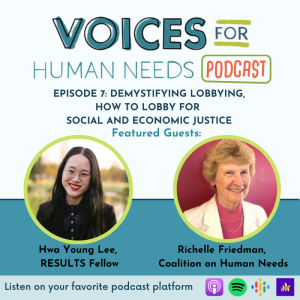
CHN’s Podcast Episode 7: Demystifying Lobbying: How You Can Lobby for Social and Economic Justice
 Episode Summary
Episode Summary
In order to Build Back Better, anti-poverty advocates and our partners across the country have been leveraging various tools and strategies to move the needle towards progress both to federal policy and at the local level. Whether it be securing a pathway to immigration reform in the reconciliation package, expanding the Child Tax Credit to combat child poverty, or increasing funding for housing and healthcare programs to reduce and end homelessness, the Voices for Human Needs podcast has encouraged listeners to take action on some of the most pressing anti-poverty policy and advocacy campaigns happening now.
This episode of the Voices for Human Needs podcast is all about demystifying one key, and powerful advocacy tool that can be used by advocates for social and economic justice from all ages, locations, and backgrounds: lobbying.
For many young people, or often anyone unfamiliar with the policymaking that goes on inside the Beltway of Washington D.C, lobbying their elected officials might sound like an activity that is out of reach, or not one to be used on behalf of policy that advances social and economic justice. But the Coalition on Human Needs’ very own Director of Public Policy, Richelle Friedman, will share why anyone can, and should, get involved in lobbying Congress and their local governments.
In addition, we are joined by Hwa Young Lee is a 23-year-old grassroots advocate based out of Dallas, Texas. Hwa Young is a volunteer with one of our member organizations, RESULTS, a national movement of volunteers learning to use their voices to advocate on behalf of policies that address poverty including through education, health, and economic opportunity.
HOW TO LISTEN
Listen to our show wherever you get your podcasts (Spotify, Apple Podcasts, Google Podcasts, and more)! Follow and subscribe to receive notifications when we release a new episode. The full transcript of this podcast episode is available here. If you haven’t already, check out our past episodes.
LOBBYING VERSUS ADVOCACY
The Alliance for Justice states that “while all lobbying is advocacy, not all advocacy is lobbying.” Advocacy is any action that speaks in favor of or argues for a cause, or in support of others. This can include using one’s voice to bring greater awareness to an issue or educating others on behalf of a cause. Lobbying then is a type of advocacy that is defined by communicating with decision-makers about existing or potential legislation. What distinguishes lobbying from advocacy is attempting to influence elected officials and urging them to vote for or against specific legislation.
CHN’s Director of Public Policy, Richelle Friedman, assures those who may be intimidated by the term ‘lobbying’ that there is an additional distinction between the work of those who lobby on behalf of corporate interests, versus on behalf of issue advocacy: “Our goal [as advocates for low-income programs], is to bring about greater racial and economic justice…our goal is ultimately, to help create policies that make the lives of people who have been left out better. Corporate lobbyists, I think, are primarily driven by a profit motive for those for whom they represent.”
GRASSROOTS ADVOCATES LOBBY TO MAKE AN IMPACT IN THEIR COMMUNITIES
Hwa Young Lee shares with listeners her experiences as a RESULTS fellow and advocate lobbying her congressional representative in Dallas, Texas on behalf of global education, the COVID-19 Hate Crimes Act, and housing policy. She acknowledges the challenges that are present for many young people to feel as though they have the time, energy, or power to communicate with their elected officials on behalf of legislation that would make an impact for them and their communities.
However, Hwa Young also emphasizes the importance of putting in whatever time, effort, or energy a person may have to give in order to see real differences in their communities: “An object at rest will stay at rest unless a greater force acts upon it. If we are going to see change in our democracy, if we are going to truly be able to come into a more equitable future, we are going to have to put in that effort.”
Listen in for actions you can take to use your voice, lobby your elected officials, and fight for legislation or policies that would make a significant impact for you and/or the most vulnerable members of your communities! Start by taking some of the actions below as mentioned in this episode.
ACTIONS TO TAKE NOW:
- Take action with RESULTS
- Submit a letter to the editor today urging your members of Congress to vote YES on the Build Back Better plan when it comes up for a vote.
- Write a letter to the editor about issues affecting your community using a template from RESULTS.
- Apply before November 20, 2021 to or share the RESULTS Organizing and Advocacy Fellowship Application
- Volunteer as a grassroots advocate with RESULTS
- Text RESULTS to 50457 to sign up for text action alerts.
- Take action with the Coalition on Human Needs
- Use our Build Back Better National Call-In Days Script and social media toolkit to call your representatives in Congress and urge them to pass the Build Back Better!
- Join the Strengthening America’s Values and Economy (SAVE) for All campaign
- Organizations: Sign on your organization to the SAVE for All 2021 Statement of Principles
- Individuals: Tell Congress: Fight for our human needs agenda!
- Learn more:
- Advocacy v. Lobbying– The National Council of Nonprofits
- What is Lobbying Under the 501(h) Election?– Alliance for Justice, Bolder Advocacy
- The Role of a Lobbyist As a Social Advocate
Please note: Hwa Young Lee has since stepped down as the point person for TX-24 due to redistricting.
Apple Podcasts:
Spotify:

